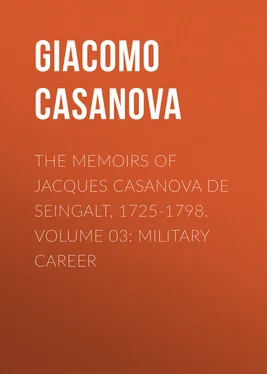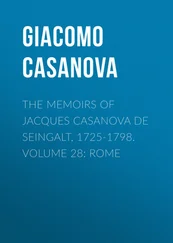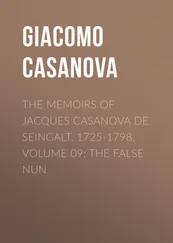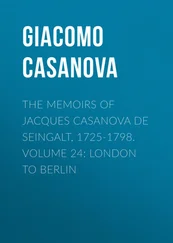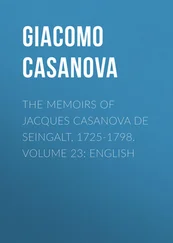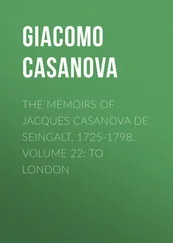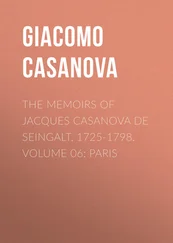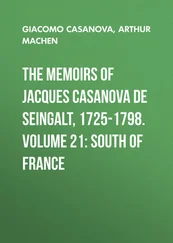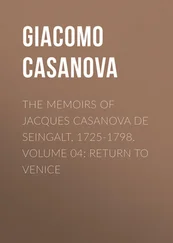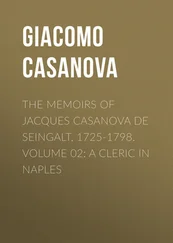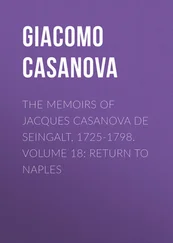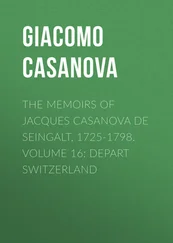Giacomo Casanova - The Memoirs of Jacques Casanova de Seingalt, 1725-1798. Volume 03 - Military Career
Здесь есть возможность читать онлайн «Giacomo Casanova - The Memoirs of Jacques Casanova de Seingalt, 1725-1798. Volume 03 - Military Career» — ознакомительный отрывок электронной книги совершенно бесплатно, а после прочтения отрывка купить полную версию. В некоторых случаях можно слушать аудио, скачать через торрент в формате fb2 и присутствует краткое содержание. Жанр: Биографии и Мемуары, История, foreign_edu, foreign_antique, foreign_prose, на английском языке. Описание произведения, (предисловие) а так же отзывы посетителей доступны на портале библиотеки ЛибКат.
- Название:The Memoirs of Jacques Casanova de Seingalt, 1725-1798. Volume 03: Military Career
- Автор:
- Жанр:
- Год:неизвестен
- ISBN:нет данных
- Рейтинг книги:3 / 5. Голосов: 1
-
Избранное:Добавить в избранное
- Отзывы:
-
Ваша оценка:
- 60
- 1
- 2
- 3
- 4
- 5
The Memoirs of Jacques Casanova de Seingalt, 1725-1798. Volume 03: Military Career: краткое содержание, описание и аннотация
Предлагаем к чтению аннотацию, описание, краткое содержание или предисловие (зависит от того, что написал сам автор книги «The Memoirs of Jacques Casanova de Seingalt, 1725-1798. Volume 03: Military Career»). Если вы не нашли необходимую информацию о книге — напишите в комментариях, мы постараемся отыскать её.
The Memoirs of Jacques Casanova de Seingalt, 1725-1798. Volume 03: Military Career — читать онлайн ознакомительный отрывок
Ниже представлен текст книги, разбитый по страницам. Система сохранения места последней прочитанной страницы, позволяет с удобством читать онлайн бесплатно книгу «The Memoirs of Jacques Casanova de Seingalt, 1725-1798. Volume 03: Military Career», без необходимости каждый раз заново искать на чём Вы остановились. Поставьте закладку, и сможете в любой момент перейти на страницу, на которой закончили чтение.
Интервал:
Закладка:
Giacomo Casanova
The Memoirs of Jacques Casanova de Seingalt, 1725-1798. Volume 03: Military Career
CHAPTER XIII
I Renounce the Clerical Profession, and Enter the Military Service—Therese Leaves for Naples, and I Go to Venice—I Am Appointed Ensign in the Army of My Native Country—I Embark for Corfu, and Land at Orsera to Take a Walk
I had been careful, on my arrival in Bologna, to take up my quarters at a small inn, so as not to attract any notice, and as soon as I had dispatched my letters to Therese and the French officer, I thought of purchasing some linen, as it was at least doubtful whether I should ever get my trunk. I deemed it expedient to order some clothes likewise. I was thus ruminating, when it suddenly struck me that I was not likely now to succeed in the Church, but feeling great uncertainty as to the profession I ought to adopt, I took a fancy to transform myself into an officer, as it was evident that I had not to account to anyone for my actions. It was a very natural fancy at my age, for I had just passed through two armies in which I had seen no respect paid to any garb but to the military uniform, and I did not see why I should not cause myself to be respected likewise. Besides, I was thinking of returning to Venice, and felt great delight at the idea of shewing myself there in the garb of honour, for I had been rather ill-treated in that of religion.
I enquired for a good tailor: death was brought to me, for the tailor sent to me was named Morte. I explained to him how I wanted my uniform made, I chose the cloth, he took my measure, and the next day I was transformed into a follower of Mars. I procured a long sword, and with my fine cane in hand, with a well-brushed hat ornamented with a black cockade, and wearing a long false pigtail, I sallied forth and walked all over the city.
I bethought myself that the importance of my new calling required a better and more showy lodging than the one I had secured on my arrival, and I moved to the best inn. I like even now to recollect the pleasing impression I felt when I was able to admire myself full length in a large mirror. I was highly pleased with my own person! I thought myself made by nature to wear and to honour the military costume, which I had adopted through the most fortunate impulse. Certain that nobody knew me, I enjoyed by anticipation all the conjectures which people would indulge in respecting me, when I made my first appearance in the most fashionable cafe of the town.
My uniform was white, the vest blue, a gold and silver shoulder-knot, and a sword-knot of the same material. Very well pleased with my grand appearance, I went to the coffee-room, and, taking some chocolate, began to read the newspapers, quite at my ease, and delighted to see that everybody was puzzled. A bold individual, in the hope of getting me into conversation, came to me and addressed me; I answered him with a monosyllable, and I observed that everyone was at a loss what to make of me. When I had sufficiently enjoyed public admiration in the coffee-room, I promenaded in the busiest thoroughfares of the city, and returned to the inn, where I had dinner by myself.
I had just concluded my repast when my landlord presented himself with the travellers' book, in which he wanted to register my name.
"Casanova."
"Your profession, if you please, sir?"
"Officer."
"In which service?"
"None."
"Your native place?"
"Venice."
"Where do you come from?"
"That is no business of yours."
This answer, which I thought was in keeping with my external appearance, had the desired effect: the landlord bowed himself out, and I felt highly pleased with myself, for I knew that I should enjoy perfect freedom in Bologna, and I was certain that mine host had visited me at the instance of some curious person eager to know who I was.
The next day I called on M. Orsi, the banker, to cash my bill of exchange, and took another for six hundred sequins on Venice, and one hundred sequins in gold after which I again exhibited myself in the public places. Two days afterwards, whilst I was taking my coffee after dinner, the banker Orsi was announced. I desired him to be shewn in, and he made his appearance accompanied my Monsignor Cornaro, whom I feigned not to know. M. Orsi remarked that he had called to offer me his services for my letters of exchange, and introduced the prelate. I rose and expressed my gratification at making his acquaintance. "But we have met before," he replied, "at Venice and Rome." Assuming an air of blank surprise, I told him he must certainly be mistaken. The prelate, thinking he could guess the reason of my reserve, did not insist, and apologized. I offered him a cup of coffee, which he accepted, and, on leaving me, he begged the honour of my company to breakfast the next day.
I made up my mind to persist in my denials, and called upon the prelate, who gave me a polite welcome. He was then apostolic prothonotary in Bologna. Breakfast was served, and as we were sipping our chocolate, he told me that I had most likely some good reasons to warrant my reserve, but that I was wrong not to trust him, the more so that the affair in question did me great honour. "I do not know," said I, "what affair you are alluding to." He then handed me a newspaper, telling me to read a paragraph which he pointed out. My astonishment may be imagined when I read the following correspondence from Pesaro: "M. de Casanova, an officer in the service of the queen, has deserted after having killed his captain in a duel; the circumstances of the duel are not known; all that has been ascertained is that M. de Casanova has taken the road to Rimini, riding the horse belonging to the captain, who was killed on the spot."
In spite of my surprise, and of the difficulty I had in keeping my gravity at the reading of the paragraph, in which so much untruth was blended with so little that was real, I managed to keep a serious countenance, and I told the prelate that the Casanova spoken of in the newspaper must be another man.
"That may be, but you are certainly the Casanova I knew a month ago atCardinal Acquaviva's, and two years ago at the house of my sister, MadameLovedan, in Venice. Besides the Ancona banker speaks of you as anecclesiastic in his letter of advice to M. Orsi:"
"Very well, monsignor; your excellency compels me to agree to my being the same Casanova, but I entreat you not to ask me any more questions as I am bound in honour to observe the strictest reserve."
"That is enough for me, and I am satisfied. Let us talk of something else."
I was amused at the false reports which were being circulated about me, and, I became from that moment a thorough sceptic on the subject of historical truth. I enjoyed, however, very great pleasure in thinking that my reserve had fed the belief of my being the Casanova mentioned in the newspaper. I felt certain that the prelate would write the whole affair to Venice, where it would do me great honour, at least until the truth should be known, and in that case my reserve would be justified, besides, I should then most likely be far away. I made up my mind to go to Venice as soon as I heard from Therese, as I thought that I could wait for her there more comfortably than in Bologna, and in my native place there was nothing to hinder me from marrying her openly. In the mean time the fable from Pesaro amused me a good deal, and I expected every day to see it denied in some newspaper. The real officer Casanova must have laughed at the accusation brought against him of having run away with the horse, as much as I laughed at the caprice which had metamorphosed me into an officer in Bologna, just as if I had done it for the very purpose of giving to the affair every appearance of truth.
On the fourth day of my stay in Bologna, I received by express a long letter from Therese. She informed me that, on the day after my escape from Rimini, Baron Vais had presented to her the Duke de Castropignano, who, having heard her sing, had offered her one thousand ounces a year, and all travelling expenses paid, if she would accept an engagement as prima-donna at the San Carlo Theatre, at Naples, where she would have to go immediately after her Rimini engagement. She had requested and obtained a week to come to a decision. She enclosed two documents, the first was the written memorandum of the duke's proposals, which she sent in order that I should peruse it, as she did not wish to sign it without my consent; the second was a formal engagement, written by herself, to remain all her life devoted to me and at my service. She added in her letter that, if I wished to accompany her to Naples, she would meet me anywhere I might appoint, but that, if I had any objection to return to that city, she would immediately refuse the brilliant offer, for her only happiness was to please me in all things.
Читать дальшеИнтервал:
Закладка:
Похожие книги на «The Memoirs of Jacques Casanova de Seingalt, 1725-1798. Volume 03: Military Career»
Представляем Вашему вниманию похожие книги на «The Memoirs of Jacques Casanova de Seingalt, 1725-1798. Volume 03: Military Career» списком для выбора. Мы отобрали схожую по названию и смыслу литературу в надежде предоставить читателям больше вариантов отыскать новые, интересные, ещё непрочитанные произведения.
Обсуждение, отзывы о книге «The Memoirs of Jacques Casanova de Seingalt, 1725-1798. Volume 03: Military Career» и просто собственные мнения читателей. Оставьте ваши комментарии, напишите, что Вы думаете о произведении, его смысле или главных героях. Укажите что конкретно понравилось, а что нет, и почему Вы так считаете.
